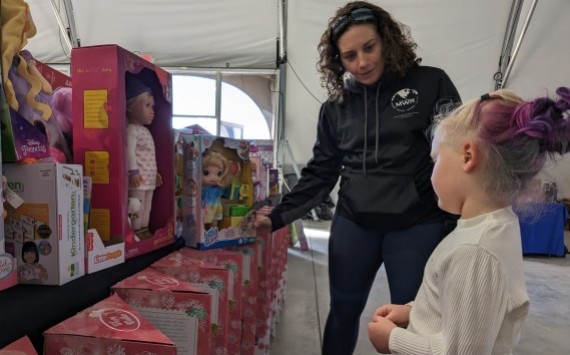FORT IRWIN, Calif. — Hiring Our Heroes, a nonprofit program focused on helping veterans and their spouses find employment, joined with the USO to host a day-long “transition summit” at Fort Irwin April 3.
The summit was designed to educate Soldiers and their family members about resources and best practices that will allow them to successfully join the civilian workforce after they complete their military service.
Transitioning out of the Army is something all service members face eventually, said Col. Seth Krummrich, Fort Irwin’s garrison commander.
“Our military careers can best be described as a choose-your-own-adventure. We all joined for our own unique reasons, we had different occupational specialties, duty locations and deployments,” he said during the event’s opening remarks. “Our pasts have been our own personal journeys, but they all have one thing in common: they will all come to an end. At some point, whether you’re a first-term Soldier or the Chairman of the Joint Chiefs of Staff, this ride has to come to a stop.”
The unemployment rate for veterans who served after September 2001 is currently 4.3 percent, just above the overall U.S. unemployment rate of 4.1 percent, according to the Bureau of Labor Statistics. But even as more companies in the private sector are looking to hire veterans, transitioning successfully takes a lot of forward planning.
“You really do need to put in the time and effort to research and target where you want to go and what you want to do. Those are the first questions you need to ask yourself and be honest with yourself,” said Marnie Holder, director of transition summits and virtual events for Hiring Our Heroes, U.S. Chamber of Commerce Foundation. “It’s not about just capturing what your military experience was or what your experience has been in the past, it’s really understanding how to translate that experience into the job you want. So you need to know where you’re going in order to package yourself and market yourself and promote yourself for the next career.”
One of the biggest challenges for transitioning service members is translating their military experience into civilian terms.
“They don’t realize they have had amazing training, and a lot of responsibility at a very junior level. So when they’re coming in, they are trained as leaders from day one,” said Holder, noting that many of their peers in the civilian sector do not have that experience. For military spouses, who may have gaps in their resumes due to military moves, it is important to gain and highlight volunteer experience, she said.
“Don’t allow that gap to just be a gap in time. Fill that doing something and be able to articulate how you filled that time, and used that time, to position yourself for when the job is available.”
She also encouraged service members and their families to take advantage of the many resources available to help with their transition. Hiring Our Heroes, for example, has an online tool called Resume Engine that helps military members explain their experience to civilian employers. The Army’s Soldier for Life program helps direct Soldiers to professional development and networking resources, and it also promotes the value of Soldiers and Veterans to private organizations, government, non-profit organizations and universities. Virtual networking sites like LinkedIn are also powerful tools for researching and reaching potential employers and mentors, Holder said.
The biggest thing is to start early.
“It is never too early to start thinking about [your transition] and educating yourself about what’s out there,” said Holder. “What you need to do is own it, be clear in where you want to go.”
More information about Hiring Our Heroes can be found at http://www.hiringourheroes.org. The Resume Engine tool can be found at https://resumeengine.org/#/.












